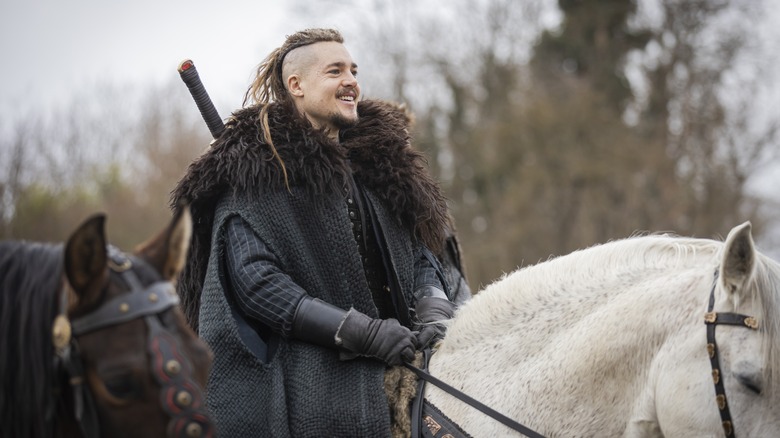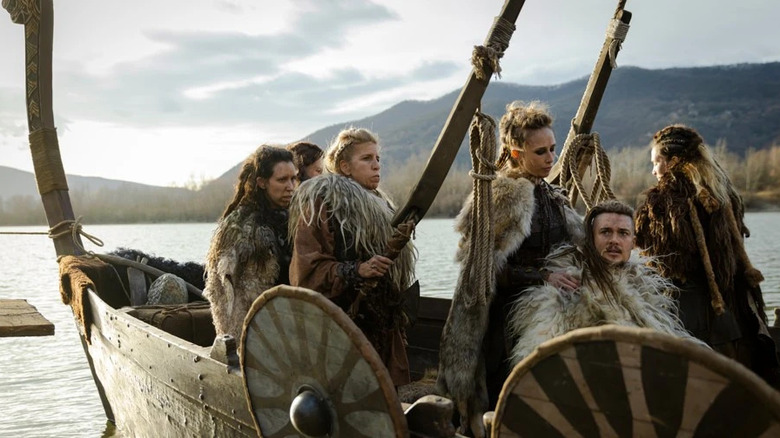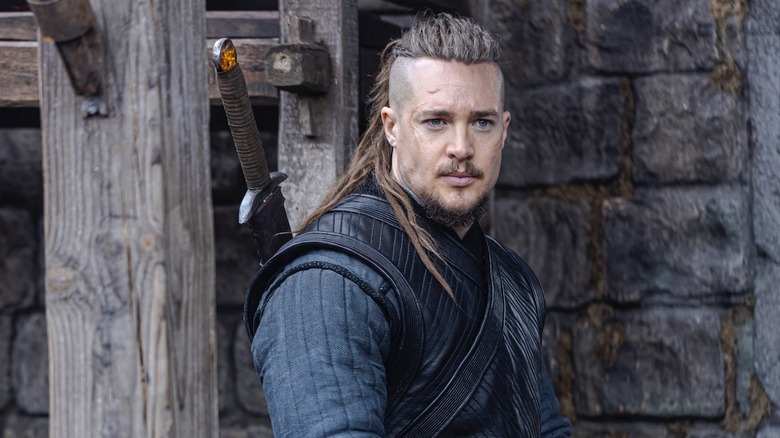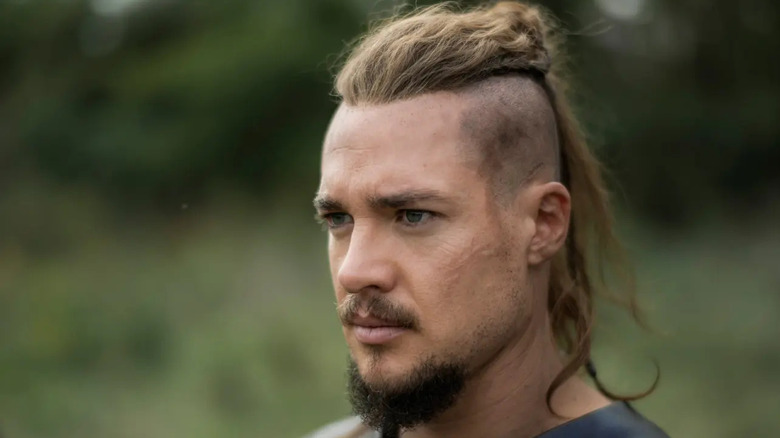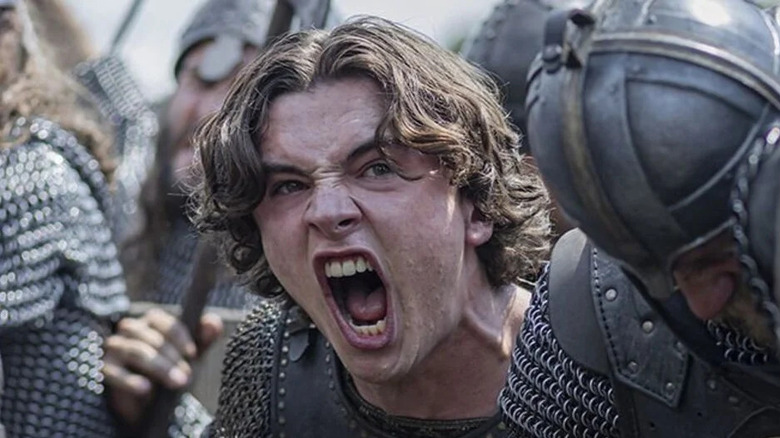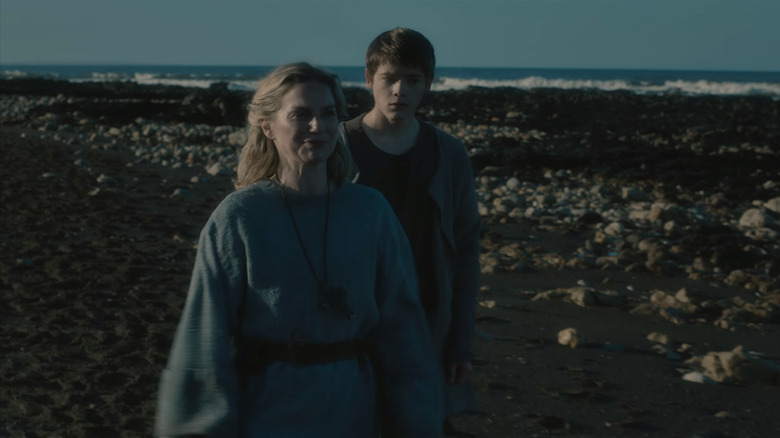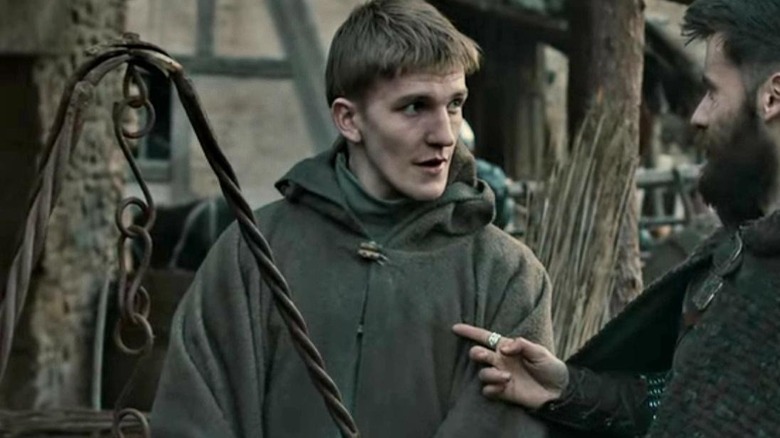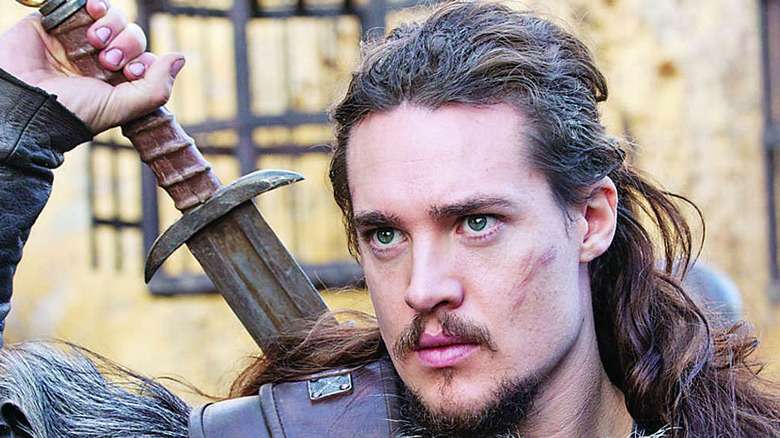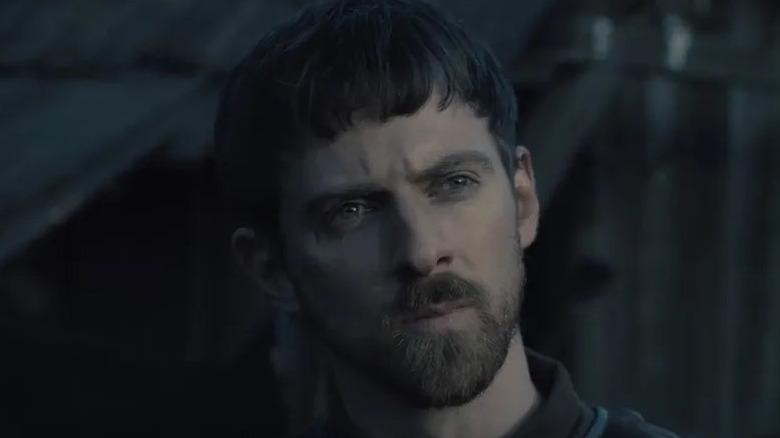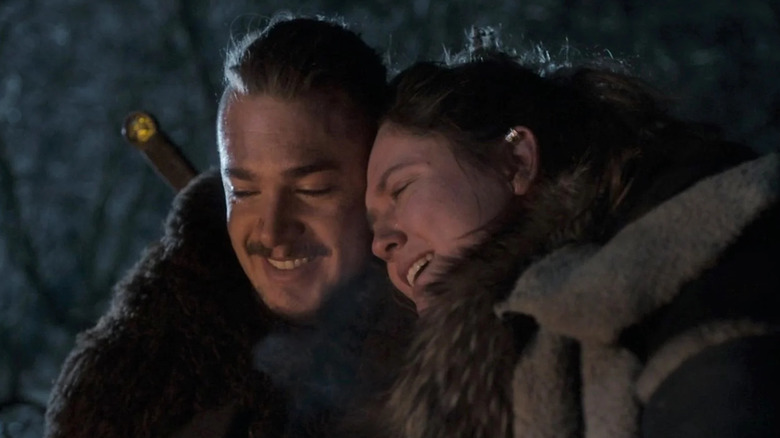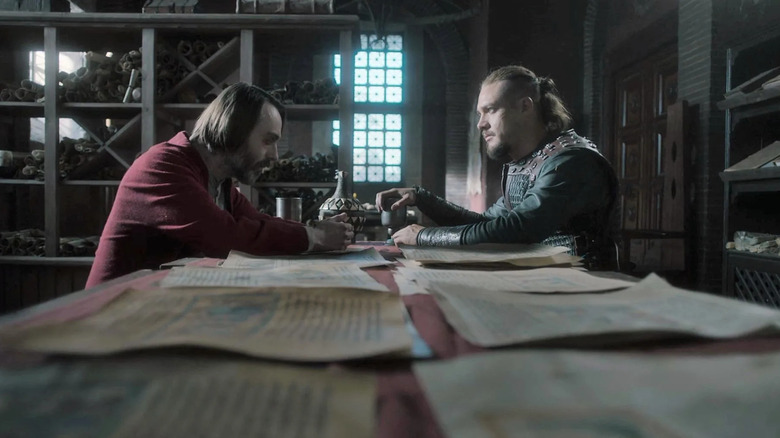Small Details You Missed In The Last Kingdom: Seven Kings Must Die
Contains spoilers for "The Last Kingdom: Seven Kings Must Die"
Before England became one of the largest empires ever, it first had to unite from within. The Anglo-Saxon Chronicle of nation-building is one of the single most important sources for historians about the period between the Romans and William the Conqueror, yet "The Last Kingdom" tells us there's one huge omission: Uhtred of Bebbanburg is nowhere in it. His adventures on the Netflix series span the reign of the great Saxon king Alfred and culminate in the movie "The Last Kingdom: Seven Kings Must Die" two generations later.
"The Last Kingdom" has been a Netflix hit in part because it grounds its intrigues, loyalties, romances, and betrayals in a (mostly true) adaptation of history. The Uhtred of Bebbanburg portrayed by Alexander Dreymond wasn't a real person, but he was based — albeit loosely — on Uhtred the Bold. Most of the other events, at least as pertain to the kings and Jarls who color the English countryside in "The Last Kingdom," actually happened in some capacity.
"Seven Kings Must Die," the eagerly anticipated movie that finishes the story, ends in an England run by Danes and Saxons, more unified than it had ever been before. Of course Uhtred, the man born as a Saxon noble but raised by Danes, would be the one to unite the major kingdoms of England. Yet given that this is a film finishing up a streaming series based on a book series, it's full of callbacks and details reaching back years. Some of these are pretty obvious, but others you might just have missed.
Wolf Warriors came from the books
"The Last Kingdom: Seven Kings Must Die" opens with a raid on a village by Wolf Warriors, led by the Irish warlord Anlaf. A pelt is found later upon the discovery of their destructive slaughter. Yet you would be forgiven for not knowing that Wolf Warriors were known for their savagery and that they used a special ointment that sounds like medieval speed to increase their berserker prowess.
Of course, if you'd read Bernard Cornwell's Saxon series, upon which the Netflix series is based, you'd know he had a novel named "War of the Wolf." In that novel, Sköll, uncle to Ingilmundr (Aethelstan's seducer in "Seven Kings Must Die"), attacks Sigtryggr's castle, killing Stiorra (Uhtred's daughter, who survives on Netflix). There's an epic final battle where Sigtryggr and Uhtred fight Sköll's army of Wolf Warriors and defeat them.
So while this detail in the movie is a shoutout to the books, it also lets book fans know that Anlaf is on a savage journey of conquest.
We go to the last Kingdom
There are a lot of ways you could interpret the title of the Netflix series "The Last Kingdom." But in "Seven Kings Must Die," the authoritative explanation presents itself: Northumbria, and specifically Uhtred's England, is the last kingdom in King Alfred's dream of unification.
When the series began, King Alfred had Wessex, which was already a big chunk of England. Historians point to the fact that the four kingdoms presented during "The Last Kingdom" — Wessex, East Anglia, Mercia, and Northumbria — were all made up of smaller kingdoms they'd already absorbed. Over the course of the series, Alfred creates an alliance with Mercia by marrying his daughter Æthelflæd to the king of Mercia, Æthelred. He conquers East Anglia and then dies, leaving Mercia and East Anglia to Æthelflæd, which brings it into an even closer alliance with Alfred. So only Northumbria remains (though "Seven Kings Must Die" shows us that Mercia has certainly fallen apart in recent years).
Uhtred and Edward take back Bebbanburg in the "Last Kingdom" series finale, though Uhtred vows not to give it to Edward. When Edward's widow Eadgifu, fearing conquest upon her husband's death, looks for somewhere to escape outside Wessex, she says "We go to the last kingdom." That is, of course, Northumbria: The only one left independent of the rest.
Uhtred was always the final piece to a unified England
The story of Uhtred is one of the unification of England as told by arguably the man most central to the whole effort. While in the end his own man, Uhtred is the lead sword for Alfred, his children, and his grandchildren as they go about building a nation. He only becomes a king in his own right once he and Edward retake Bebbanburg at the end of the series.
As Father Pyrlig says on the eve of their final great battle at Brunanburh against five other kings, England has become a country of both Saxons and Danes — who better to lead their army than a man who identifies as both? Uhtred embodies what their vision of England would look like, with English pedigree and Danish intensity.
Brunanburh was a real battle, as were the deaths of five kings and seven earls in the conflict. A quote from the Chronicle appears in the film: "No slaughter yet was greater made e'er in this island, of people slain, before this same, with the edge of the sword." Of course, the death count gives this film its name. It is often considered by historians to be the greatest unifying battle of medieval England.
Uhtred can finally give Northumbria to England
Of course, Uhtred's role as a great unifier is made strikingly clear at the end, when he gives Northumbria to Aethelstan, finally bringing together all four kingdoms into one great England. He could not do this previously, in part because at the end of "The Last Kingdom," he'd convinced King Constantine of Scotland not to continue his battles on the border only by promising he would never give his kingdom to Edward.
Now Constantine has been routed after betraying this very agreement. And Uhtred sees in Aethelstan a humbled but respectable king. It should be added that Aethelstan was the only king to thank Uhtred for everything he did for the kingdom, without asking for something in return. Historically, Aethelstan is acknowledged as the first king of England. As the 12th-century chronicler William of Malmesbury said, "No one more just or more learned ever governed the kingdom."
The Skade and Bloodhair mention
At the beginning of "Seven Kings Must Die," a leisurely Uhtred is carrying on with his friends in Bebbanburg. One mentions Skade and Bloodhair, though Finan is then reminded that his own wife is a seer, as had been the temptress Skade.
This is a reminder of a strange turn in Uhtred's already bizarre tale. Skade had been a bloodthirsty seer, aligned with Bloodhair until she discovered that Uhtred would be a more successful warrior. She used witchcraft to essentially control Uhtred. This was pretty much the most power Uhtred had ceded to any other human in the entire run of "The Last Kingdom." She is also tied to the fact that the movie is focused on a prophecy that seven kings must die. They went on to die by the end of the movie and, voila, England is made. Skade had predicted Uhtred's path would be great, but unfortunately, she didn't have the clairvoyance to see that Uhtred would drown her.
Osbert was kept safe for a reason
Uhtred had three children with his wife Gisela. They should be one happy family, except that Uhtred's life wasn't really conducive to parenting. When he falls out with a king, bam, his kids have to go to a safe place while he runs through the wild. In the series, we see his eldest son, young Uhtred, go to a Catholic monastery to join his father and ultimately wind up castrated. Stiorra marries the Danish king Sigtryggr before starting her own Danish tribe upon his death. But the youngest boy, Osbert, is gone, and you might even forget he ever existed.
Yet at the end of the series, when Hildi returns to Uhtred's fold in his final push to retake his home, we see her talking to a boy. She tells him she's going to take him to somebody who might know about his parentage. When the boy asks if the man might have met his father, she responds coyly, "Something like that."
Of course, that boy is Osbert, and the irony is that the son ignored throughout the series is front and center in "Seven Kings Must Die." It makes sense, since lacking the drama of growing up alongside the peripatetic Uhtred (and possessing the ability to procreate) would make Osbert the kind of son who could actually take over his father's kingdom. Plus, he's all too eager to please the man who the other kids view with a weary admiration laced with some very real daddy issues.
Uhtred's ironic quotes
Uhtred seems to revel in his old age in "Seven Kings Must Die," and brings a certain ironic humor to his role as an aging king. One great quote comes when Uhtred is told about how Aethelstan is being brainwashed by a Catholic brotherhood. "I have scared off such men before — monks find me terrifying." Not only does this comment refer to Uhtred's roots as a Dane, who were known to sack monasteries for all the shiny religious relics, but it's also probably a callback to when Uhtred killed Brother Godwin. Godwin is an angry little man and vehemently opposed to Danes. He tells Uhtred that his beloved Danish wife who died in childhood was a pagan whore. In response, Uhtred knocks the brother down, in a church, and the Brother dies. Alfred then declares Uhtred into a criminal for the murder, despite the fact that it's unlikely he would have won any of his battles without Uhtred.
Another poignant line from Uhtred: "Only fools try to understand destiny." This is an interesting quote, especially because every episode started off with Uhtred saying "Destiny is all." For that reason, he acts as if he is heading in a definite direction to some great point. Then, with a moment of clarity, he admits that if he did think he knew where he was going, he now believes such thoughts to be folly. Think of it as the closest to a crisis of faith he ever has.
Aethelstan: Another Saxon victim of religion
While there is a lot to admire about the Saxons, their blind adherence to their faith is not one. While one could argue that religion helped them conquer England, it has also served as a millstone around the necks of the kings of Wessex — especially when it comes to Uhtred.
Alfred's wife, Eahlswith, spends much of the series telling her husband not to trust Uhtred because he's a pagan. This leads to a lot of infighting between the great king and the great warrior, which could've otherwise been avoided. Then Alfred's son, Edward, is forced to give up his first wife to a convent because his parents deemed her a poor match, thus naming their son Aethelstan a bastard. This creates even more strife, especially when Edward marries a "proper" woman, only to soon grow bored with her as she devotes herself to religion. Uhtred also mentions Edward's unwillingness to accept the Danes, grounded in his religion, as his main cause of hesitation in helping deliver to him a united England.
Finally, in "Seven Kings Must Die," Aethelstan falls victim to the religious guilt imposed on him by Brother Ingilmundr (as he simultaneously pursues a tryst with the holy man, leading to even more guilt). This combination of religious fervor and manipulation by Ingilmundr (who, in fact, is still a Dane) leads Aethelstan to kill Aldhelm, push away Uhtred, and all but destroy himself.
Uhtred loses (and finds) his closest companion
Uhtred's adventure in the land of the Saxons is a long and winding one, with some steadfast friends he picks up along the way. But the only companion with him the whole way is his sword, Serpent's Breath.
The series begins with Uhtred returning to Saxon land with a chunk of amber he asks a blacksmith to incorporate into a new sword. The amber was the only heirloom from his ancestral line and his brief childhood in Bebbanburg, seen in the brief scenes of young Uhtred early on. That sword is with him throughout his many battles, daring rescues, and thrilling escapes. In "Seven Kings Must Die," Uhtred loses Serpent's Breath during a battle. Finan gets him a better sword, but when Uhtred finds Serpent's Breath hanging off a belt on the eve of Brunanburh, he takes it back, giving the man his new sword: No person or thing has been with Uhtred has been with him as long as the amber that adorns Serpent's Breath's hilt.
Aldhelm does what's right, for the last time
Aldhelm is a truly interesting character. His loyalty belongs firmly to his land, not the royals he serves. He aided Æthelred until he could no longer abide the king's poor treatment of Æthelflæd. As Aldhelm began to see Æthelflæd would be a better ruler, he disobeys his king to protect and save his queen.
Throughout this series, Aldhelm almost invariably does the right thing, including in "Seven Kings Must Die," when Aldhelm helps Uhtred and Aethelstan, who is at this point deep in Ingilmundr's control. Aldhelm allows Uhtred to escape and regroup and, in the end, that decision saves Aethelstan and the united kingdom of England. But it doesn't go so well for Aldhelm: Aethelstan accuses Aldhelm of turning his back on Aethelstan, and so Aethelstan walks away as Aldhelm gets hung.
So a man who had always tried to do the right thing, and was never afraid to question his leader when they were on the wrong path, pays the ultimate price. Such is life in "The Last Kingdom."
Uhtred's vision of Valhalla
There are already debates about whether Uhtred dies at the end of "Seven Kings Must Die." Only six kings are seen to die, unless Ælfweard's death counts. This means that, since Uhtred is all but considered a king, his death must count. Whatever the final answer, there's one indisputable fact: Uhtred sees Valhalla.
He sees Odin's great hall, where all his Danish people feast and laugh and prepare for the next day's battle. At the first table is his early Danish family. There's Brida, at the front. Then Uhtred's adopted father, Earl Ragnar. Then an early ally, Clapa, and finally his sometimes-friend, sometimes-enemy, Haesten. This is the table Uhtred longs for, though of course it also means he will never see his Saxon friends again.
As Uhtred is left with this great conundrum, he notices the tears of his earthbound friends, and we wonder: Where does Uhtred of Bebbanburg, born a Saxon but raised a Dane, go when he dies? Two things are certain: Brida never left the front of his heart, and he will not go down in history for all he has done.
Uhtred refuses to be in the Chronicle
While still alive, Alfred shows Uhtred the historical notes he has been gathering that will form the Chronicle. He also says that despite all of Uhtred's efforts and victories, he will never be in the Chronicle, because he is a Dane and a Pagan. Alfred's feelings on the matter are inscrutable, but he absolutely doesn't show any intention of changing his mind on this. It's simply a fact.
After Uhtred helps win the battle of Brunanburh for Alfred's grandson Aethelstan (though, admittedly, one he'd rejected), the young king tells Uhtred he will have his chroniclers add Uhtred to the story. But Uhtred refuses. He doesn't want to be part of it. Perhaps he simply decides he doesn't need such immortal prestige. Or maybe he doesn't think his story is fit for a Saxon history. Whatever the reason, Uhtred's decision means that he will be utterly forgotten after he dies.
His was a journey of adventure and destiny, not a battle for glory. Despite all that he achieved, Uhtred remains surprisingly humble. He'll leave the great stories to the pompous kings he's served with a wry smile his whole life. Fulfilling his own destiny is all Uhtred ever wanted.
